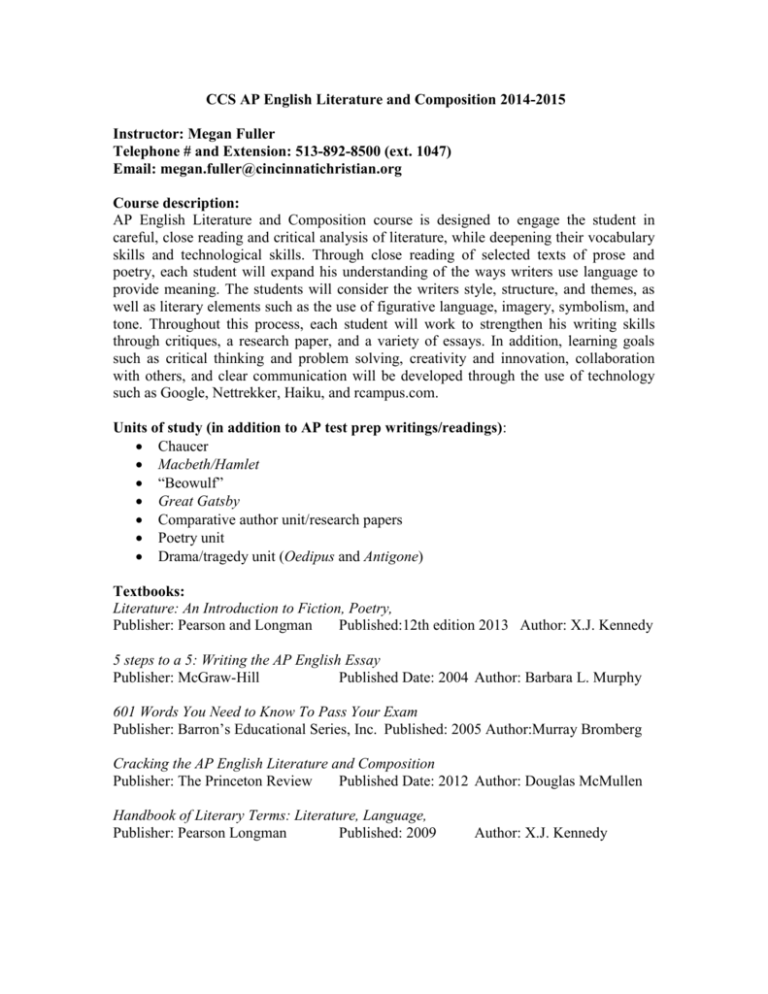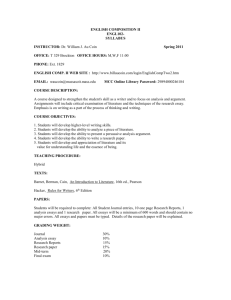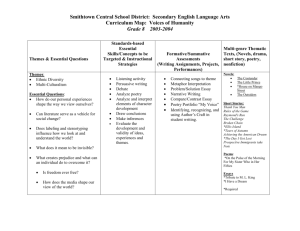
CCS AP English Literature and Composition 2014-2015
Instructor: Megan Fuller
Telephone # and Extension: 513-892-8500 (ext. 1047)
Email: megan.fuller@cincinnatichristian.org
Course description:
AP English Literature and Composition course is designed to engage the student in
careful, close reading and critical analysis of literature, while deepening their vocabulary
skills and technological skills. Through close reading of selected texts of prose and
poetry, each student will expand his understanding of the ways writers use language to
provide meaning. The students will consider the writers style, structure, and themes, as
well as literary elements such as the use of figurative language, imagery, symbolism, and
tone. Throughout this process, each student will work to strengthen his writing skills
through critiques, a research paper, and a variety of essays. In addition, learning goals
such as critical thinking and problem solving, creativity and innovation, collaboration
with others, and clear communication will be developed through the use of technology
such as Google, Nettrekker, Haiku, and rcampus.com.
Units of study (in addition to AP test prep writings/readings):
Chaucer
Macbeth/Hamlet
“Beowulf”
Great Gatsby
Comparative author unit/research papers
Poetry unit
Drama/tragedy unit (Oedipus and Antigone)
Textbooks:
Literature: An Introduction to Fiction, Poetry,
Publisher: Pearson and Longman
Published:12th edition 2013 Author: X.J. Kennedy
5 steps to a 5: Writing the AP English Essay
Publisher: McGraw-Hill
Published Date: 2004 Author: Barbara L. Murphy
601 Words You Need to Know To Pass Your Exam
Publisher: Barron’s Educational Series, Inc. Published: 2005 Author:Murray Bromberg
Cracking the AP English Literature and Composition
Publisher: The Princeton Review
Published Date: 2012 Author: Douglas McMullen
Handbook of Literary Terms: Literature, Language,
Publisher: Pearson Longman
Published: 2009
Author: X.J. Kennedy
Supply List:
Pencils, black or blue pens, red pen for editing, highlighter
1 ½ inch or larger 3 ring binder (with 5 sections) and plenty of paper
Literature textbook cover (can wait until 1st week of school to purchase – odd size)
5 binder dividers labeled: essays, literature notes, AP exam prep, terms, vocabulary
Method of Instruction: Students in AP Literature and Composition can expect to write
major essays (test grades) roughly every week. Essays will be graded according to the AP
scoring system and adapted to fit the high school grading system, so that students will
receive feedback on their writing in both ways. Students will participate in some peerediting exercises throughout the year, and will occasionally have the opportunity to
rewrite certain aspects of essays. As quoted previously, each student will expand his
understanding of the ways writers use language to provide meaning, through close
reading of selected texts of prose and poetry. The students will consider the writer’s style,
structure, and themes, as well as literary elements such as the use of figurative language,
imagery, symbolism, and tone. In addition, learning goals such as critical thinking and
problem solving, creativity and innovation, collaboration with others, and clear
communication will be developed through the use of technology such as Google,
Nettrekker, Haiku, and rcampus.com.
Major Assignments and/or Assessments:
All grading is done on a point scale. Refer to unit timeframes for assignments.
1. Summer reading – 100 points per novel project.
2. Major tests and IR projects - 200 points each.
3. AP essays – graded on a 9 point scale to simulate AP literature exam scoring
1st & 2nd quarter - 9=100
8=98
7= 96
6=94
4=85
3=80
2=70
1=60
rd
th
3 and 4 quarter - 9=100
8=95
7= 90
6=85
4=75
3=70
2=60
1=50
5=90
5=80
4. Vocabulary tests - 50 point grade each.
5. Literature quizzes are weighted based on the number of questions.
6. Homework - 10 points per assignment.
7. The research paper - 500-1,000points.
Classroom policies:
No eating or drinking in class.
Always have your laptop charged and ready to go when class begins.
Late work will receive a 10 point deduction per calendar day it is late.
Use MLA format for all papers.
Make-up work – It is your responsibility to obtain missed assignments the day you miss
school, via online, through an email, or a classmate. You have 5 calendar days from the
absence to hand in missing work from an excused absence, or take any tests.
Plagiarism Policy:
There is a zero tolerance policy for cheating and plagiarism in this class.
According to the Merriam-Webster Online Dictionary, to "plagiarize" means
to steal and pass off (the ideas or words of another) as one's own
to use (another's production) without crediting the source
to commit literary theft
to present as new and original an idea or product derived from an existing
source.
In other words, plagiarism is an act of fraud. It involves both stealing someone else's
work and lying about it afterward.
All of the following are considered plagiarism:
• turning in someone else’s work as your own; you should not buy a paper, use something
from the Internet, or use someone else’s paper
• copying words or ideas from someone else without giving credit
• failing to put a quotation in quotation marks
• giving incorrect information about the source of a quotation
• changing words but imitating the sentence structure and /or style of a source without
giving credit
• copying so many words or ideas from a source that it makes up the majority of your
work, whether you give credit or not
• having others edit a paper when the instructor doesn’t allow external assistance
From http://plagiarism.org/learning_center/what_is_plagiarism.html
AP literature comprehensive essential questions:
How do students become proficient writers and analytical readers, so that they are
prepared for freshman year of college and a life of writing?
What is universal about human nature and human identity?
Does man have the power to determine his destiny, or is his merely a victim of fate?
How do the texts read in class play with reality and illusion?
What can different theories add to our understanding of a text?
How do titles contribute to the overall meaning of a story?
What constitutes a life worth living?
What elements of society act against an individual’s search for understanding of self?
How does literature express the values of society?
Unit name/timeframe:
In addition to the weekly plans below, students will have weekly vocabulary lists and
tests (total of 30 lists). Students meet for 90 minutes every other day, and they will have
15 words per week. Day 1 distribute vocab, define, and practice. Day 2 of list - review/go
over. Day 3 - test.
Week 1 - AP class orientation, summer reading projects presented, course website and
calendar, personal inventory and writing profile, introduction to vocabulary, and list 1.
Practice essay 1.
Week 2 - Summer presentations & novels shared; journals critiqued. Practice essay 2.
MPC practice 1.
Week 3 - College Entrance/scholarship essay (5 steps). 15 topics based (1 per student)
from chapter 12 of 5 steps to a 5 - Writing the AP English essay. Vocab list 2. “Goods
and bads” of essays, low vs. high scoring essays. Commonly missed MPC errors. Practice
essay 3 &4. Exam prep book chapters 1&2.
Weeks 4-5 - Vocab lists 3-4…. Exam prep book chapters 3&4, 8&9. Kate Chopin and
“Eros” essays.
Week 5 - The Great Gatsby/Chaucer - study of rhetorical strategies, cause and effect, GG
essay for test grade.
Week 6 - The Great Gatbsy/Chaucer, peer editing 1 day in class for Great Gatsby novel
essay, independent reading assigned (from AP most tested list), begin short story unit.
Weeks 6-8 - Short story/fiction unit - John Updike, Aesop, Faulkner, Porter, Chopin,
Crane, Steinbeck. IR projects continued; short story literary elements; focus on
connections between history and literature. Practice MPC exam, and IR presentations
week 8.
Week 9 - Short story elements – characterization, theme, symbols, setting. Research
paper discussion – comparative authors unit.
Week 10 - Research paper compare/contrast prep. Prune last year’s papers, choose 2nd
author, and focus on thesis.
Week 11 - Research paper sources, outline, bibliography page finished.
Week 12 - “Beowulf” unit due (epic elements and all five poetic devices studied), MPC
practice, research paper work continued.
Week 13 - Destiny library learning. Rough drafts due.
Week 14 - Peer edits, AP essay over the qualities of an epic. How to do a
compare/contrast paper.
Week 15 - Final papers due with revisions and both authors covered. IR project 2
assigned. Vocab cont.
Week 16 - Shakespeare unit – Macbeth or Hamlet Acts I-III. Drama – study literary
elements of a play.
Week 17-18 Write for College practice activities, review for exams, exams, 2nd IR
project due.
Weeks 19 - Test Prep - Cracking the AP exam, techniques. Shakespeare competition.
Week 20 - AP essay critiques – read, score, defend.
Week 21 - Continue essay practice, poetry unit begins with Johnson/Donne focus, poetry
terms study with weekly quizzes (70 terms comprehensive review)
Weeks 22-23 - Poetry continued, poetry practice essays 1&2, compose examples of 15 of
30 poetic terms, and find and share examples of the others. Introduce helpful AP
websites.
Week 24 - Poetry - study meter, form, and multicultural poetry (Angelou, Hughes, Li
Po), and then authors from junior year as a review.
Weeks 25-26 - AP practice book chapters 5&6, 18 poems from AP lit book, student
choice, MPC questions produced by students, completed and critiqued, poetry essays
3&4
Weeks 27-28 - Poetry terms tests continued (3&4), African protest poetry, how to do a
poetry rubric, sonnets, and IR project 3 begin.
Weeks 29-30 - Review 3 poems a night for next 16 nights (until exam). Finish IR project.
Midnight in Paris while searching for literary analogies/allusions. Poetry terms test 5&6.
Week 30 - Final poetry terms test (7), begin tragedy unit – Oedipus and Antigone.
Week 31 - Finish Oedipus, review Shakespeare and short story units. Test prep - writing
about literature - explicating, analyzing, compare/contrast. Numerous practice essay tests.
Week 32 - Shakespeare criticism paper – research and discussion. Read personal choice
play. IR presentations.
Week 33 - Shakespeare criticism paper due. Review of all vocab. “Realism” discussion.
Week 34 - Types of criticism reviewed; final presentations. Begin short dramas.
Week 35 - Shaw, Ibsen, A Doll’s House, Glass Menagerie, Sound of a Voice
Week 36 – Prep for and AP exam
Week 37 - APA style format “crash course” and college “need to know” skills week
Week 38-39 - senior trip and seniors exempt from exams
Thoughts, advice, and comments from former students on this AP Lit. Class:
· Be sure you are interested in literature, because it will be much harder to do the work if
you are not.
· This is much like a college class. There is a lot of work and you are expected to do and
know a lot. Stay on top of it and pay attention!
· Read the books—not just the Cliff’s Notes (they won’t work). This includes summer
reading! You can’t pass an AP class without reading the books.
· Make notes as you read, so that you retain the material better and save time.
· There are fewer grades, so do well on everything. Sometimes if you take care of smaller
grades (homework, quizzes, etc.), they help bring up bigger ones.
· Be prepared for quote tests (in other words, you will be expected to know the things you
read very well).
· When you do get graded homework assignments, do them. They are important!
· Expect a lot of reading and writing assignments that you don’t really work on in class.
There are more long-term deadlines to keep up with, so don’t slack off.
· Don’t do the essay the night before. You’ll get a ‘C’ or worse. Give yourself time to
write and edit your essays; do not try to write and edit both the same day.
· Grammar and details do matter. A lot.
· Don’t wait until the last weekend to read. You won’t do well on the test or essay about
it. Instead, pace yourself. Cramming all the reading in before the test doesn’t really give
you time to let the work sink in.
· Keep track of all your book notes and thoughts. Google Docs is a great way to share.
· Study and prepare for class, not just for tests. Think of things to ask and say in class
discussions the night before.
· Actually talk in class. Discussing the works is what AP Literature is all about--learning
to interpret what you read. Don’t just sit and listen. Listen, but talk, too. You might just
surprise yourself with what you know.








